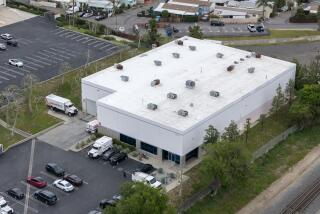Verdugo crime lab prepares to open
A new, long-awaited regional crime laboratory could begin processing vital ballistic analysis and DNA evidence for hundreds of unsolved property crimes in Glendale, Burbank and Pasadena as early as May, police said.
The Verdugo Regional Crime Laboratory, based in Glendale, will enable quicker processing of crime scene evidence, officials said.
“We could use DNA early on to intercede as rapidly as possible,” Glendale Police Chief Ron De Pompa said at a news conference last week. “The sooner we intercede, the sooner we identify the culpable suspects, the sooner we break that crime cycle.”
Rep. Adam Schiff (D-Burbank) secured $1.5 million in 2009 to establish the lab and relieve a DNA-testing backlog in violent and property crimes and other police investigations.
“The growth of a regional lab like this helps to empower the people in these communities to make sure that people who are victimized here don’t go without redress,” Schiff said.
The Los Angeles County Sheriff’s Department processes most DNA evidence for at least 88 law enforcement agencies in the region. Police said the sheriff’s lab processed DNA samples from Glendale, Burbank and Pasadena only if they were connected to major violent crimes, leaving a backlog for property crimes.
In some homicide cases, Glendale detectives have waited a year for DNA samples to be processed, police said.
Soon after receiving funding, Glendale police commanders drew up plans to reconstruct the department’s existing forensic photo lab into a full-scale DNA-processing operation.
The lab will specialize in computer forensics, crime scenes and latent prints, examine DNA evidence for violent and property crimes and analyze ballistics through a partnership with the federal Bureau of Alcohol, Tobacco, Firearms and Explosives. In some cases, vital DNA analysis could be turned around in 72 hours, officials said.
The lab still needs to be certified by the FBI and the American Society of Crime Laboratory Directors/Laboratory Accreditation Board. The accreditation process will take about a month, De Pompa said.
Grant funding paid for DNA-processing equipment, including a $55,000 DNA extraction robot, a $175,000 genetic analyzer, computers, lab supplies and water purification and temperature monitoring systems.
More to Read
Start your day right
Sign up for Essential California for news, features and recommendations from the L.A. Times and beyond in your inbox six days a week.
You may occasionally receive promotional content from the Los Angeles Times.






